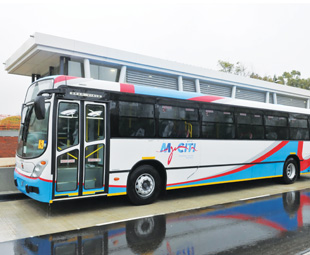Splendid buses for a splendid system

Remember those carefree days playing Marco Polo in the swimming pool, lounging the summer holidays away with friends and laughter
Remember those carefree days playing Marco Polo in the swimming pool, lounging the summer holidays away with friends and laughter … Well, the introduction of MyCiti, Cape Town’s IRT system, has enabled some in the city to experience some of that insouciance afresh. Commuters are able to relax in a comfortable bus without having to worry about the twin nasties of traffic and road rage.
The system has been designed to make life easier for the Mother City’s inhabitants, alleviate congestion and significantly improve the overall public transport service provided in the greater Cape Town metropolitan area. However, none of this would be possible without the buses – and with bus bodies from bodybuilder Marcopolo and chassis from Volvo Southern Africa Bus Division, the architects of the system chose well.
The 52 units with their Marcopolo Gran Viale bodies – 44 12-metre long B7R solo and eight 18-metre B12MA articulated buses, to be exact – are currently in service and have been assigned to the IRT trunk route services. According to communication from MyCiti, they will be temporarily used on the feeder routes in the central business district and Table View areas.
The City’s Supply Chain Management Bid Adjudication Committee announced the Volvo and Marcopolo team as the preferred bidder for the supply of the IRT trunk vehicles in October 2009. This led to the initial procurement of 43 buses for the 2010 FIFA World Cup as an integral part of the transport services for that event.
Marius Botha, general manager of the Bus Division at Volvo Southern Africa, says major time constraints were involved: the units had to be delivered in time for the World Cup. “However, the Volvo and Marcopolo team overcame this by putting 100 percent focus on the planning schedule,” he explains. “Fortunately, there were no shipping delays as our international and local plants kept to the planned schedules. As a result, the logistics worked out perfectly both locally and internationally.”
These buses, together with those subsequently delivered, are operated by three companies and, as Botha explains, maintained through Volvo Gold and Marcopolo bodywork maintenance and repair contracts. “The vehicles meet all SABS and road ordinance regulatory requirements,” he points out. “And the chassis are equipped with automatic transmission and EBS 5 braking systems.”
Botha adds that the B7R solo chassis are assembled locally and the bodies are manufactured at Marcopolo’s South African branch.
“The fleet will further expand,” he says. “A tender is currently out for the supply of additional solo and articulated units, with low and high floors.”
Cape Town’s MyCiti project has definitely chosen a winning combination for its IRT system, one that will ensure safe and carefree transportation in the Mother City and surrounding areas.
“This system will definitely bring about a reduction in private passenger traffic volumes, which will contribute to a lower environmental impact on the City,” emphasises Botha. “It also offers the city’s passengers an affordable world-class service.” He adds that the current buses meet Euro-4 emissions control standards.
Only time will tell exactly how positive MyCiti’s impact will be on the public transport system in South Africa’s oldest city, but with Volvo and Marcopolo on board, it’s set to be a pleasurable drive into the future.
Published by
Focus on Transport
focusmagsa




